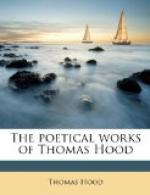O clasp me, sweet, whilst thou art mine,
And do not take my tears amiss;
For tears must flow to wash away
A thought that shows so stern as this:
Forgive, if somewhile I forget,
In woe to come, the present bliss;
As frighted Proserpine let fall
Her flowers at the sight of Dis,
Ev’n so the dark and bright will kiss.
The sunniest things throw sternest shade,
And there is ev’n a happiness
That makes the heart afraid!
Now let us with a spell invoke
The full-orb’d moon to grieve our eyes;
Not bright, not bright, but, with a cloud
Lapp’d all about her, let her rise
All pale and dim, as if from rest
The ghost of the late-buried sun
Had crept into the skies.
The Moon! she is the source of sighs,
The very face to make us sad;
If but to think in other times
The same calm quiet look she had,
As if the world held nothing base,
Of vile and mean, of fierce and bad;
The same fair light that shone in streams,
The fairy lamp that charmed the lad;
For so it is, with spent delights
She taunts men’s brains, and makes them mad.
All things are touch’d with Melancholy,
Born of the secret soul’s mistrust,
To feel her fair ethereal wings
Weigh’d down with vile degraded dust;
Even the bright extremes of joy
Bring on conclusions of disgust,
Like the sweet blossoms of the May,
Whose fragrance ends in must.
O give her, then, her tribute just,
Her sighs and tears, and musings holy;
There is no music in the life
That sounds with idiot laughter solely;
There’s not a string attuned to mirth,
But has its chord in Melancholy.
SONNET.
By ev’ry sweet tradition of true hearts,
Graven by Time, in love with his own lore;
By all old martyrdoms and antique smarts,
Wherein Love died to be alive the more;
Yea, by the sad impression on the shore,
Left by the drown’d Leander, to endear
That coast for ever, where the billow’s roar
Moaneth for pity in the Poet’s ear;
By Hero’s faith, and the foreboding tear
That quench’d her brand’s last twinkle
in its fall;
By Sappho’s leap, and the low rustling fear
That sigh’d around her flight; I swear by all,
The world shall find such pattern in my act,
As if Love’s great examples still were lack’d.
SONNET.
TO MY WIFE.
The curse of Adam, the old curse of all,
Though I inherit in this feverish life
Of worldly toil, vain wishes, and hard strife,
And fruitless thought, in Care’s eternal thrall,
Yet more sweet honey than of bitter gall
I taste, through thee, my Eve, my sweet wife.
Then what was Man’s lost Paradise!—how
rife
Of bliss, since love is with him in his fall!
Such as our own pure passion still might frame,
Of this fair earth, and its delightful bow’rs,
If no fell sorrow, like the serpent, came
To trail its venom o’er the sweetest flow’rs;—
But oh! as many and such tears are ours,
As only should be shed for guilt and shame!




